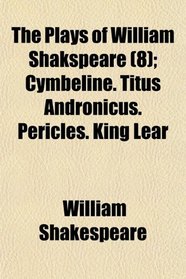Search -
The Plays of William Shakspeare (8); Cymbeline. Titus Andronicus. Pericles. King Lear
The Plays of William Shakspeare Cymbeline Titus Andronicus Pericles King Lear - 8
Author:
Volume: 8 General Books publication date: 2009 Original publication date: 1811 Original Publisher: J. Nichols Subjects: Drama / Shakespeare Literary Criticism / Shakespeare Notes: This is a black and white OCR reprint of the original. It has no illustrations and there may be typos or missing text. When you buy the General Books edition ... more »
Author:
Volume: 8 General Books publication date: 2009 Original publication date: 1811 Original Publisher: J. Nichols Subjects: Drama / Shakespeare Literary Criticism / Shakespeare Notes: This is a black and white OCR reprint of the original. It has no illustrations and there may be typos or missing text. When you buy the General Books edition ... more »
ISBN-13: 9781150301094
ISBN-10: 1150301090
Publication Date: 12/22/2009
Pages: 340
Rating: ?
ISBN-10: 1150301090
Publication Date: 12/22/2009
Pages: 340
Rating: ?
0 stars, based on 0 rating




